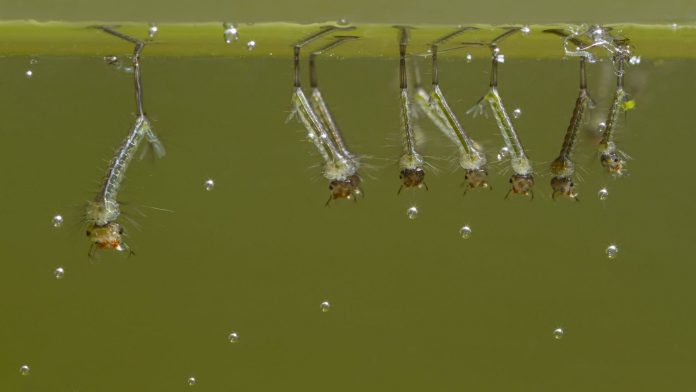The longing for sun and warmth is great. But with spring comes mosquitoes. Or did the onset of winter destroy them?
After two cold, wet weeks, the sun is making its way and temperatures in Germany are becoming summery for the first time. What we humans long for also allows an unpleasant insect to thrive: mosquitoes. Anyone who spent time near bodies of water over the weekend could see the little pests buzzing around.
What is clear is that the onset of winter over the past few days has had no impact on the mosquito population. On the contrary: the cold has little effect on our native insects. It even helps them, because in mild winters the animals are much more susceptible to deadly fungal infestation.
A lot of snow in winter can also lead to more mosquitoes in summer, explains entomologist Ronald Bellstedt from the Thuringian Entomological Association to MDR. “It's more favorable for the mosquitoes that want to bite us, because we get a lot of small bodies of water full of water. When they thaw, it leads to a wet spring, and that's actually favorable compared to recent years.”
Doreen Werner from the Leibniz Center for Agricultural Landscape Research (Zalf) in Müncheberg explains that the mosquito season even started particularly early this year. Werner says: “The beginning is dependent on the weather, often at the beginning of May. This year, however, house mosquitoes laid their eggs at the beginning of April, and forest and meadow mosquitoes were already hatching at this time.” (Also read: Repel mosquitoes with home remedies.)
The decisive point will now be the rain. For example, mosquitoes like to lay their eggs in puddles, rain barrels or even in moist soil, says Werner. The larvae need the water and mild temperatures to hatch. “If the puddles don't hold, the larvae can't develop.”
Will we be faced with a plague of mosquitoes this summer? “I can’t look into the crystal ball,” says Werner. But what she can say: The forest and meadow mosquitoes are developing splendidly – they are slightly larger and more biting than the house mosquitoes.
Mosquitoes as a food source
We humans find mosquitoes annoying, but for birds and bats they are an integral part of the food chain. Fish and tadpoles also eat mosquito larvae that live in water. (Also read: Do mosquitoes have any benefit?)
Asian tiger mosquito will continue to spread in Germany
And what about invasive species that are becoming native to us? According to the biologist, the Asian tiger mosquito (Aedes albopictus) will also continue to spread in Germany. The exotic mosquito species originally comes from South and Southeast Asia, but is also increasingly found in Central Europe. In Germany it is already buzzing in Bavaria, Baden-Württemberg, Hesse, Thuringia and Berlin.
Werner and her research team can see this using the mosquito atlas. Mosquitoes are mapped there using submissions from the population. The team currently receives 20 to 30 submissions per day.
Exotic mosquito species such as the Asian tiger mosquito or the Japanese bush mosquito have long been known to transmit pathogens such as the Zika, dengue or chikungunya virus. However, various prerequisites are necessary for the viruses to spread.


